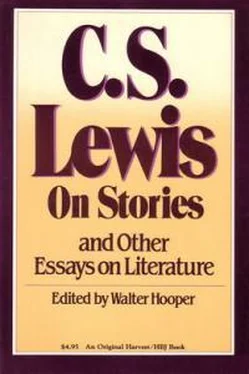The Three Musketeers , makes no appeal to me at all. The total lack of atmosphere repels me. There is no country in the book—save as a storehouse of inns and ambushes. There is no weather. When they cross to London there is no feeling that London differs from Paris. There is not a moment's rest from the 'adventures': one's nose is kept ruthlessly to the grindstone. It all means nothing to me. If that is what is meant by Romance, then Romance is my aversion and I greatly prefer George Eliot or Trollope. In saying this I am not attempting to criticize
The Three Musketeers . I believe on the testimony of others that it is a capital story. I am sure that my own inability to like it is in me a defect and a misfortune. But that misfortune is evidence. If a man sensitive and perhaps over–sensitive to Romance likes least that Romance which is, by common consent, the most 'exciting' of all, then it follows that 'excitement' is not the only kind of pleasure to be got out of Romance. If a man loves wine and yet hates one of the strongest wines, then surely the sole source of pleasure in wine cannot be the alcohol?
If I am alone in this experience then, to be sure, the present essay is of merely autobiographical interest. But I am pretty sure that I am not absolutely alone. I write on the chance that some others may feel the same and in the hope that I may help them to clarify their own sensations.
In the example of King Solomon's Mines the producer of the film substituted at the climax one kind of danger for another and thereby, for me, ruined the story. But where excitement is the only thing that matters kinds of danger must be irrelevant. Only degrees of danger will matter. The greater the danger and the narrower the hero's escape from it, the more exciting the story will be. But when we are concerned with the 'something else' this is not so. Different kinds of danger strike different chords from the imagination. Even in real life different kinds of danger produce different kinds of fear. There may come a point at which fear is so great that such distinctions vanish, but that is another matter. There is a fear which is twin sister to awe, such as a man in war–time feels when he first comes within sound of the guns; there is a fear which is twin sister to disgust, such as a man feels on finding a snake or scorpion in his bedroom. There are taut, quivering fears (for one split second hardly distinguishable from a kind of pleasureable thrill) that a man may feel on a dangerous horse or a dangerous sea; and again, dead, squashed, flattened, numbing fears, as when we think we have cancer or cholera. There are also fears which are not of danger at all: like the fear of some large and hideous, though innocuous, insect or the fear of a ghost. All this, even in real life. But in imagination, where the fear does not rise to abject terror and is not discharged in action, the qualitative difference is much stronger.
I can never remember a time when it was not, however vaguely, present to my consciousness. Jack the Giant–Killer is not, in essence, simply the story of a clever hero surmounting danger. It is in essence the story of such a hero surmounting danger from giants . It is quite easy to contrive a story in which, though the enemies are of normal size, the odds against Jack are equally great. But it will be quite a different story. The whole quality of the imaginative response is determined by the fact that the enemies are giants. That heaviness, that monstrosity, that uncouthness, hangs over the whole thing. Turn it into music and you will feel the difference at once. If your villain is a giant your orchestra will proclaim his entrance in one way: if he is any other kind of villain, in another. I have seen landscapes (notably in the Mourne Mountains) which, under a particular light, made me feel that at any moment a giant might raise his head over the next ridge. Nature has that in her which compels us to invent giants: and only giants will do. (Notice that Gawain was in the north–west corner of England when 'etins aneleden him', giants came blowing after him on the high fells. Can it be an accident that Wordsworth was in the same places when he heard 'low breathings coming after him'?) The dangerousness of the giants is, though important, secondary. In some folk–tales we meet giants who are not dangerous. But they still affect us in much the same way. A good giant is legitimate: but he would be twenty tons of living, earth–shaking oxymoron. The intolerable pressure, the sense of something older, wilder, and more earthy than humanity, would still cleave to him.
But let us descend to a lower instance. Are pirates, any more than giants, merely a machine for threatening the hero? That sail which is rapidly overhauling us may be an ordinary enemy: a Don or a Frenchman. The ordinary enemy may easily be made just as lethal as the pirate. At the moment when she runs up the Jolly Roger, what exactly does this do to the imagination? It means, I grant you, that if we are beaten there will be no quarter. But that could be contrived without piracy. It is not the mere increase of danger that does the trick. It is the whole image of the utterly lawless enemy, the men who have cut adrift from all human society and become, as it were, a species of their own—men strangely clad, dark men with ear–rings, men with a history which they know and we don't, lords of unspecified treasure buried in undiscovered islands. They are, in fact, to the young reader almost as mythological as the giants. It does not cross his mind that a man—a mere man like the rest of us—might be a pirate at one time of his life and not at another, or that there is any smudgy frontier between piracy and privateering. A pirate is a pirate, just as a giant is a giant.
Consider, again, the enormous difference between being shut out and being shut in: if you like between agoraphobia and claustrophobia. In King Solomon's Mines the heroes were shut in: so, more terribly, the narrator imagined himself to be in Poe's Premature Burial . Your breath shortens while you read it. Now remember the chapter called 'Mr. Bedford Alone' in H. G. Wells's First Men in the Moon . There Bedford finds himself shut out on the surface of the Moon just as the long lunar day is drawing to its close—and with the day go the air and all heat. Read it from the terrible moment when the first tiny snowflake startles him into a realization of his position down to the point at which he reaches the 'sphere' and is saved. Then ask yourself whether what you have been feeling is simply suspense. 'Over me, around me, closing in on me, embracing me ever nearer was the Eternal … the infinite and final Night of space.' That is the idea which has kept you enthralled. But if we were concerned only with the question whether Mr. Bedford will live or freeze, that idea is quite beside the purpose. You can die of cold between Russian Poland and new Poland, just as well as by going to the Moon, and the pain will be equal. For the purpose of killing Mr. Bedford 'the infinite and final Night of space' is almost entirely otiose: what is by cosmic standards an infinitesimal change of temperature is sufficient to kill a man and absolute zero can do no more. That airless outer darkness is important not for what it can do to Bedford but for what it does to us: to trouble us with Pascal's old fear of those eternal silences which have gnawed at so much religious faith and shattered so many humanistic hopes: to evoke with them and through them all our racial and childish memories of exclusion and desolation: to present, in fact, as an intuition one permanent aspect of human experience.
And here, I expect, we come to one of the differences between life and art. A man really in Bedford's position would probably not feel very acutely that sidereal loneliness. The immediate issue of death would drive the contemplative object out of his mind: he would have no interest in the many degrees of increasing cold lower than the one which made his survival impossible. That is one of the functions of art: to present what the narrow and desperately practical perspectives of real life exclude.
Читать дальше











